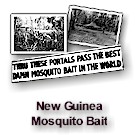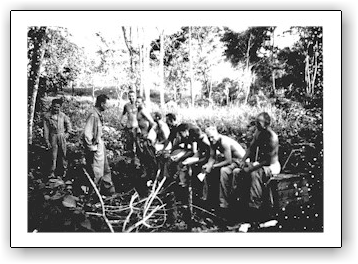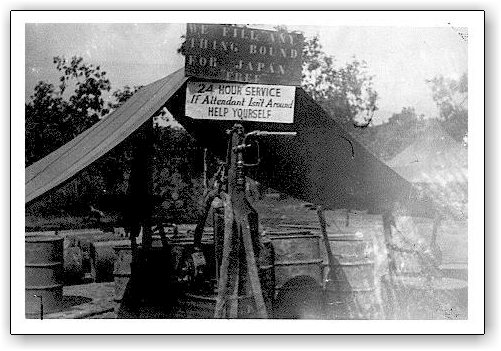|

_________________
Chapter 3
TO
INDEX















|

We
broke camp, loaded our barracks bags, boarded trucks and moved to Cairns where a
ship was waiting to take us to our unknown destination. One day out we were told
we were headed to New Guinea. As I think back, this trip was uneventful for I do
not recall any alerts during the voyage.
Approaching
Port Moresby I observed a P-38 Fighter Plane making power stalls over the
Harbor. The pilot would climb till the motor stalled then nose over into a dive
restart and go into another climb. On the third dive he did not recover and the
plane dove into the Harbor. As we passed, a Native had recovered the Pilot, who
seemed to be all right.
Disembarking,
we boarded trucks and were moved into the jungle several miles from Port
Moresby. The sights along the way created quite a stir, as none of us had ever
seen a total populace of women bare-chested. This novelty passed in a very short
time.
|
|
As we rode along I saw a
sign put up across the road by troops who had been there earlier. The sign read
"Through these portals pass the best Damn Mosquito bait in the World." Reading
the back side of the sign on your way to Port Moresby it read "I told you so."
It did not take long to understand what they meant by "Mosquito Bait."
The
site for our camp was located just below the camp of the Fifth Air Force, who
were settled in and had all the conveniences they could muster already in place.

My first assignment was to
take a few men and install a shower, for which one and one
half mile of four inch pipe was made available. I went looking for water. About
one half mile from camp I found a waterfall, where water was flowing over an
embankment about fifty foot high, giving me all the force I needed to deliver
water to camp. Using a Fifty-five gallon drum, with its top removed, and cutting
a hole in the bottom to fit the pipe I proceeded to have pipe run to the camp
site, which luckily was down hill from the water fall. Two twenty foot sections
of pipe was placed across seven foot logs standing three to a cluster, these two
sections were then drilled with one-eighth inch holes to make shower heads.
Having everything ready and the men waiting I got into my Jeep and headed back
to the water fall to swing the fifty-five gallon drum into the cascade and start
water flowing to camp.
Completing
this manoeuvre, I raced back to witness the water gush out of the shower heads,
and to catch the reaction of the men who were standing under the shower waiting
to bathe. Well, the system worked perfectly, the water came and with it came
screams and yell of pain from the men, the water came out of the shower boiling
hot! The tropical sun had done its
job heating the pipe, but after flowing for a short time the water became ideal
for bathing. (I received a letter of commendation for this project from the Old
Man.)
 After
getting settled, activities were leisure. We spent our time cleaning guns and
taking care of personal items. Until dysentery invaded the troops. This disease
made a person feel like he had an uncontrollable bowel movement. When trying to
relieve oneself all that would pass was a few drops of blood. Dysentery also
caused a fever, and made the victim feel weak and miserable. The latrine at camp
was a 20 foot oblong box with holes cut for seats placed over a slit trench. It
was fully occupied all the time. Many a drop of blood was spilled around the
area by men who could not wait to occupy a hole on the latrine. We had not
expected that shedding blood for the war effort could suddenly be so personal. After
getting settled, activities were leisure. We spent our time cleaning guns and
taking care of personal items. Until dysentery invaded the troops. This disease
made a person feel like he had an uncontrollable bowel movement. When trying to
relieve oneself all that would pass was a few drops of blood. Dysentery also
caused a fever, and made the victim feel weak and miserable. The latrine at camp
was a 20 foot oblong box with holes cut for seats placed over a slit trench. It
was fully occupied all the time. Many a drop of blood was spilled around the
area by men who could not wait to occupy a hole on the latrine. We had not
expected that shedding blood for the war effort could suddenly be so personal.
With
time on their hands we went looking for excitement. It became common to be
invaded by Military Police looking for the jeeps stolen by Troopers wanting to
see more of New Guinea. Natives would entice us to join them on a Wallaby chase,
running and throwing spears at a fleeing wallaby-like animals. As time passed
and we became more familiar with our surroundings one of us went into the Fifth
Air Force camp for dinner. He was
treated to all they had, and compared to what he was used to, it was a feast.
Ice-cream (mixed on the ground and flown to high altitude for freezing,) fresh
beef flown in from Australia and other delicacies impossible for us to obtain.
After finishing his treat and returning to camp he told of his wonderful
experience.
The
next evening three thousand Paratroopers were at the head of their chow line
waiting to be fed, and although there was a lot of name calling, no fights broke
out and the 503rd Parachute Regiment enjoyed a fine meal.
Our
duty assignments were varied; on some occasions we were used as anti aircraft
gunners, being spread along a patch of jungle near the airfield. The few planes
we had flying would take off, fly out and engage the enemy, then with the Zeroes
on their tail they would come in across our line at tree top level, allowing us
to shoot at (and many times knock down) their adversary (usually a Jap Zero).
Other assignments were involved with keeping the Zeros from landing on our air
strip. This was done by rolling 55
gal. drums onto the runway after our planes took off, and removing them when
they returned. The Japanese pilots apparently got their kicks landing on the
runway pivoting the plane 360 degrees with wing guns blasting.

A
few of us were selected to fly gunner on B�17s.
On my first assignment as I walked toward the plane I was to fly in, I
passed an aircraft with the tail turret shot out, the remains of the gunner
still strapped in. It looked as though a bomb had gone off in the enclosure,
with his body was literally blown apart. As I proceeded on I prayed that I would
not be assigned to the tail gun, but as luck would have it, that is exactly
where I was placed. Luckily we
encountered no enemy. On the way back to airfield I was summoned forward by one
of the crew. As I crept from the turret, he was ahead of me, moving rapidly
toward the cockpit. The plane had a metal catwalk about 18 inches wide running
across the bomb bay area with uprights and a chain draped along it. I should
have expected some devilment from the crew, but I did not. About the time I
reached the center area of the plane, the bomb bay doors opened. Even though I
was wearing a seat pack parachute, the blast of air scared the hell out of me.
Grabbing an upright in each hand I sat down straddled the catwalk, wrapping my
legs around it and hanging on for dear life. Looking toward the cockpit I
witnessed the crew standing in the doorway laughing at my predicament, and
shouting "Big Brave Paratrooper!" I am not sure what our altitude was,
but during the one glimpse I took, I saw a ship on the ocean below that only
looked to be four inches long. (It was common for the Air Corps personnel to
tease paratroopers about bravery, I think mainly because we were doing the very
thing they most feared doing.)
One
morning after reporting to the air strip for assignment there were no missions
to be flown. The pilots and crewmen were busying themselves checking over their
aircraft and I heard someone yell "Hey Paratrooper!� Looking in the
direction of the yell, I saw a pilot standing alongside a P-38 fighter,
motioning for me to come over. As I approached
he told me his engines had just been overhauled and he wanted to check
them out, and would I care to go for a ride. Having nothing else to do I said O.
K.
My
seat in the fighter was the radio compartment (radio removed) directly behind
the pilot. Climbing in I squatted down, holding on to the back of the pilot's
seat. Having thick legs, my butt was not on the deck during take off, and what a
takeoff it was. I never knew when he pulled the wheels up, we skimmed the runway
toward a small mountain that projected up about 300 feet just off the end of the
runway, then pulling back on the stick he put the plane in a vertical climb
until it almost stalled. Rolling it over he made a strafing dive at the remains
of a ship laying just off the coast, then pulling out of the dive he went into
another vertical climb, repeating the dive and climb five times. Then with a
series of victory rolls, he circled for the approach to the runway. It was then
I noticed that my butt was now firmly pressed against the deck of the plane, in
fact I was so compressed in that radio compartment I needed help to get out. I
later learned the pilot was a Colonel Drum. He had initially been flying the
attack bomber known as the A�20, but only until he could no longer get a crew
to fly with him (they considered him too reckless.)
In my opinion he was a gung-ho great individual, meant to fly fighters.
After
nearly a year doing anything other than what we were sent over to this area for,
word came. We were going on our first mission. Finally we would be tested.
With
nearly half the troops suffering with dysentery, and me with malaria and
dysentery, I wondered how we could survive. My sickness was so bad they sent me
to the hospital. I missed the first mission.

|